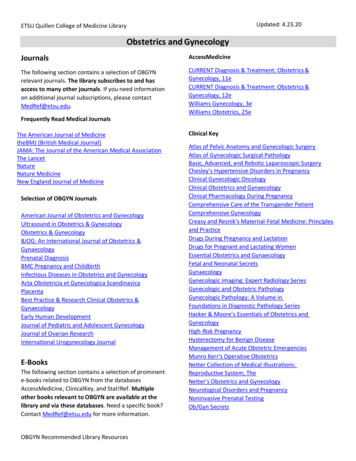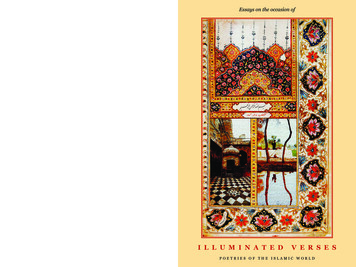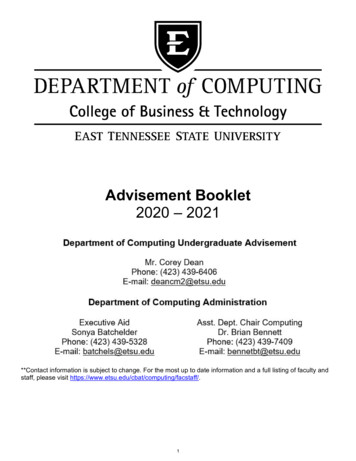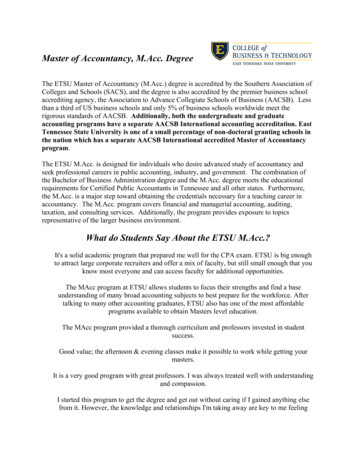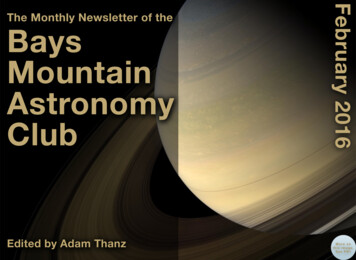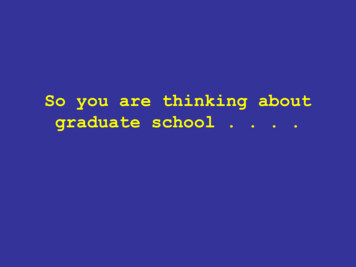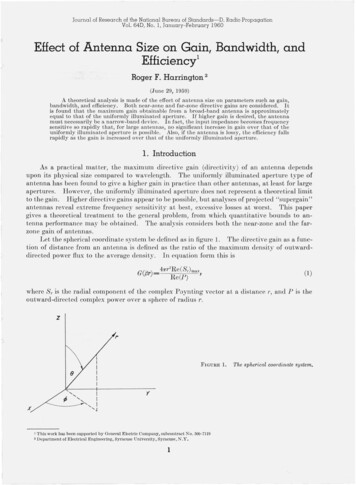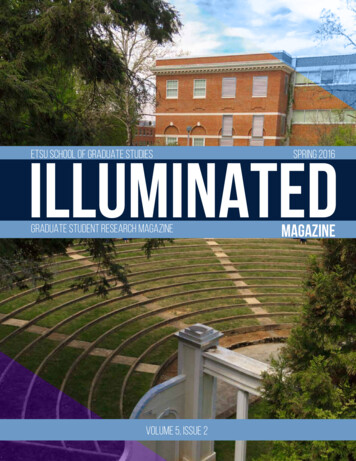
Transcription
ETSU SCHOOL OF GRADUATE STUDIESSPRING 2016ILLUMINATEDGRADUATE STUDENT RESEARCH MAGAZINECOVERMAGAZINEVOLUME 5, ISSUE 21
TABLE OF CONTENTS SPRING 2016ARTICLES040608091012131416181920FROM THE SCHOOL OFGRADUATE STUDIES0608GRADUATE STUDENT SUCCESS SPECIALISTIvy BuerkleGraduate Student Success SpecialistWHERE ARE THEY NOWMonique RichardClinical Nutrition, M.S., 201309WHERE ARE THEY NOWDavid MazureArt, M.F.A., 2009CONTEMPORARY PRINTMAKINGArt, M.F.A.Graduate Student: Marissa AngelWHERE ARE THEY NOW1016Veronica LimeberryLiberal Studies, M.A.L.S., Gender and Diversity Studies, 2014DEFYING BLACK HYPER-MASCULINITYNew Media Studio, M.A.Graduate Student: Benjamin Moten1218ACCESSIBLE LITERATURE FOR ALLSpecial Education, M.Ed.Graduate Student: Andrew BaxterWHERE ARE THEY NOWAdria McLaughlinSociology, M.A., 2015WHERE ARE THEY NOWDESIGN & PHOTOGRAPHYBenjamin MotenGraduate StudentMaster of Art, New Media StudioWRITER1319Dr. Harry WilliamsEducational Leadership, Ed.D. , 2002MORE THAN STORYTELLINGReading, M.A.Graduate Student: Wenny ElrodEDITORDr. Karin BartoszukAssociate Dean, School of Graduate StudiesWHERE ARE THEY NOWWilhelmina Van DijkEarly Childhood Special Education, M.Ed., 2014staff1420Sara HowardGraduate StudentMaster of Public Health (Epidemiology)East Tennessee State University is accredited by theCommission on Colleges, Southern Association of Collegesand Schools to award baccalaureate, masters, specialist, anddoctoral degrees. Contact the Commission on Colleges at1866 Southern Lane, Decatur, Georgia 30033-4097,telephone 404-679-4500, or Website: www.sacscoc.org withany question regarding the accreditation of East TennesseeState University.ETSU is an AA/EEO employer. TBR#260-192-15.IM
ILLUMINATED MAGAZINE SPRING 2016FROM THE SCHOOL OF GRADUATE STUDIESThe East Tennessee State University School of Graduate Studies is proud to presentILLUMINATED, a magazine that showcases the excellent work of our graduatestudents and their faculty advisors. There are over 2200 students enrolled ingraduate programs at ETSU. Illuminated presents some of our students’ researchand creative works that make meaningful contributions to various disciplines, andcontribute to our strong graduate programs. Illuminated features research andcreative projects that are currently happening on campus, and provides updates onalumni of ETSU graduate programs.Enjoy!Celia McIntosh, Ph.D.DeanKarin Bartoszuk, Ph.D.Associate DeanBrian Maxson, Ph.D.Assistant DeanGRADUATE STUDENTS & ADVISORSAre you excited about your research and would like to shareyour hypothesis or findings? You might be a perfect fit forIlluminated. There is more than one way to get involved.For current graduate students and their advisors:Are you or one of your graduate students working on a culminating experience (e.g., thesis,dissertation, capstone)? Your research could receive additional exposure through IlluminatedMagazine and help educate the rest of the campus about your department and program.This is a unique opportunity to get your work recognized!For current graduate students and their advisors:Did you or one of your students get accepted into an excellent doctoral program or receive anexcellent career opportunity? We want to hear about it! Share your story in the “Where Are TheyGoing?” section.For former graduate students and their advisors:Do you know an outstanding student who graduated from ETSU more than a year ago? We want tohear from them! The “Where Are They Now?” section features former ETSU graduate students whoare now professionals in positions across the country.Form available: http://www.etsu.edu/gradstud/documents/illuminated nomination form.pdfFor more information on nominating students or getting featured in Illuminated, please contact:Dr. Karin Bartoszuk, bartoszu@etsu.edu45
ILLUMINATED MAGAZINE SPRING 2016GRADUATE STUDENTSUCCESS SPECIALISTEach session with the GSSS is confidential*, andgraduate students are able to discuss privatematters without embarrassment. Together, theGSSS and the student are able to formulate a path formoving forward. Many graduate students struggleto balance the academic workload, a professionaljob, and family responsibilities, which is not aneasy task for anyone. Created as an initiative of theSocial Work Department and supported by theSchool of Graduate Studies, the GSSS boasts an 80percent success rate for students to continue theireducation and/or reach graduation.Ivy Buerkle outside of her office in the Sherrod Library.Twritten by sara howard - Photos By benjamin motenhe roles of the Graduate Student SuccessSpecialist (GSSS) are vital for the successof many graduate students. Ivy Buerkleis a Master of Social Work candidate whois currently filling the role as a part of herinternship. The GSSS provides services to graduatestudents in a variety of different ways:6 Assisting graduate students whoexperience unexpected life events. Setting realistic personal andacademic goals. Identifying life-work balanceissues.Part of the Graduate Student Success Specialist’sposition is to connect students to resources bothat ETSU and in the surrounding communities. Oncampus, one of the resources available for studentsupport is Bucky’s Food Pantry. It was founded in2012, because food insecurity was identified as amajor issue on campus. Bucky’s Food Pantry aidsstudents and staff who are experiencing foodinsecurity by providing supplies twice a month.Bucky’s Food Pantry not only provides food, butalso personal hygiene items such as deodorant,toothbrushes, and soap. Baby supplies such asdiapers or formula are available as donationspermit. Donations from ETSU faculty, staff, students,and community members fund the food pantry.Donations can be made to Bucky’s Food Pantry byplacing items in the blue bins around campus. Afull list of donation locations and acceptable itemscan be found at http://www.etsu.edu/foodpantry/default.aspx. The application to receive servicesfrom Bucky’s Food Pantry can be found throughthe same link.In addition to reducing the strain of food insecurity,*Unless students pose a threat to themselves or anyone else.the GSSS also connects students to other supportservices. For students who are worried aboutacademic performance, the GSSS can provide amultitude of support options. For aid with researchprojects, the graduate student librarians are anexcellent resource for help with databases andcitation managers. For students seeking academichelp, the GSSS connects students with the Centerfor Academic Achievement. It provides tutoringservices in a variety of subjects, including sessionsfor graduate-level writing. The Counseling Centeris one resource to help students with mental healthissues. The GSSS facilitates appointments to theCounseling Center. Also, the GSSS maintains strongcommunity ties to provide resources by maintainingcontacts with local charitable associations that canprovide assistance to graduate students whenavailable.The role of the GSSS extends beyond just linkinggraduate students to support services. A periodicnewsletter that highlights topics of interest forgraduate students is another aspect of the offeredservices. Previous issues include topics such ashow to de-stress during the holiday break orhow to manage anxiety. The GSSS also speaksat orientations and department meetings tomake students and professors alike aware of heravailability and services.Graduate students who are interested in the servicesdescribed should schedule an appointment.Contact information can be found at http://www.etsu.edu/gradstud/successservice.aspx. The officeis located on the fourth floor of the Sherrod Libraryin room 462. Office hours are posted on the door aswell as on the link listed above.7
ILLUMINATED MAGAZINE SPRING 2016monique richarddavid mazureClinical Nutrition, M.S., 2013Art, M.F.A., 2009WHAT DEGREE DID YOU EARN AT ETSU?I earned an M.S. in Clinical Nutrition in 2013.WHAT IS YOUR CURRENT POSITION, AND WHAT DOES THEPOSITION ENTAIL?I am the owner of Nutrition-In-Sight, (www.eatrightrx.com) and I specialize in counseling, consulting, andnutrition communication services. I counsel clientsusing integrative and functional medical nutritiontherapy (IFMNT) for eating disorders, diabetes,plant-based nutrition, sports nutrition, and weightmanagement. I also create meal plans, recommendrecipes, recommend dietary supplements, leadpresentations, speak at engagements, conductcooking demonstrations, promote nutrition throughthe media, and work with corporate wellness programsI also am an integrative clinical dietitian at Stateof Franklin Healthcare Associates in Johnson City,Tennessee. I provide counseling and consultationfor patients regarding nutritional and dietary needsto improve overall health outcomes such as weightloss and A1C levels. I educate and provide medicalnutrition therapy (MNT) and IFMNT for a variety ofhealth conditions as well as coordinate care withphysicians, nurse practitioners, and other providersIn addition, I am also a yoga instructor, writer for amonthly column in the Tri-Cities Health and WellnessMagazine, and involved in many professionalorganizations. Currently I am the Chair of theDietitians in Integrative and Functional Medicine(4100 members) within the Academy of Nutritionand Dietetics.WHAT IS THE MOST INTERESTING ASPECT OF YOUR POSITION?Since I have my own practice and work in clinics, I seea variety of different people with a range of nutritionalneeds and questions. Nutrition is such a populartopic that is directly related to one’s health. Yet, theamount of knowledge and misleading informationavailable can be staggering and quite dangerous. Iam always interested to hear stories or questions frompatients and clients who are just looking for somebasic insight (hence part of my business name) from8a reliable source that they can easily apply to theirown lives. My patients keep it interesting. Althoughmy cases can be challenging, my patients also keepme intrigued. One patient told me today, “I cameout in the cold just to see you, to tell you that youare making a difference (in my life).” These momentsmake me want to be even better, so I can continue tohelp others.HOW DID YOUR EDUCATION AT ETSU IMPACT YOUR LIFE ANDCURRENT POSITION?The coordinated program and faculty support wasso beneficial to me as a graduate student. I wasable to really gain additional critical thinking skillsrelevant to my profession and was challenged. Yet,I was nurtured by an outstanding group of faculty.Each and every one of the faculty in the nutritiondepartment, dental hygiene department, clinicaland community preceptors, and my mentors trulyhold a special place in my heart and have playedan important part in many of my accomplishments.The instructors also provided me the freedomto develop a deeper passion to apply dietetics tomany areas of my life by allowing me to attendboth domestic and international conferences.This encouraged me to serve in leadership rolesand investigate the possibilities for learning inadditional educational and professional programs.I am grateful and appreciative for my experience atETSU.DO YOU HAVE ANY ADVICE FOR CURRENT OR FUTUREGRADUATE STUDENTS?Don’t be afraid to ask questions. I am an inquirer. Attimes, this character trait can make one feel awkwardor annoying, but if questions are not asked, answerswill never be given. Learning really begins with aquestion. Also, questions can lead to opportunities.Your interest will most likely be overlooked orhanded over to someone else if you are not willingto ask for the opportunity. Get involved. Be patient.Be kind. Be respectful. Remember the more you putin to an experience, the more you will get out of thatexperience. Anything is possible wherever you are.WHAT DEGREE DID YOU EARN AT ETSU?I received my Master of Fine Arts in 2009. My area ofstudy was printmaking.WHAT IS YOUR CURRENT POSITION, AND WHAT DOES THEPOSITION ENTAIL?I am currently an associate professor of Art and Designat East Stroudsburg University in Pennsylvania. My jobentails teaching three studio courses per semester.These courses include: Illustration, Drawing 2 (FigureDrawing), Basic Drawing, 2D Design, Letterforms,Design for Communication, Infographics & DataVisualization, Graphic Design 1, and Graphic Design2. I am also one of two faculty mentors in our newlycreated, student-run design agency called New MindDesign. I am an academic advisor for students in ourArt and Design program as well. I also serve on severaluniversity committees.WHAT IS THE MOST INTERESTING ASPECT OF YOUR POSITION?I find everything about my position interesting.Everything except for grading, that is.Some of the best parts of my position include thefollowing: Though I am constantly working, being a professornever feels like a job, because I enjoy every secondof it. I am always presented with new challenges and amnever bored. I enjoy meeting and getting to know new peopleevery semester. I love seeing students develop and seeing theproduct of my hard work when students succeed. I enjoy working alongside other faculty and staffmembers who have the same vision, goals, and ideals.HOW DID YOUR EDUCATION AT ETSU IMPACT YOUR LIFE ANDCURRENT POSITION?I can honestly say that getting my M.F.A. at ETSUwas a life-changing experience. Before attendinggraduate school, I was working as a fashion designerin New York City. I had just recently been promotedto Senior Designer and was well on my way tobecoming Creative Director when the truths inherentin the fashion industry hit me. I was using my talentsand efforts to make tons of money for people thatalready had tons of money. By participating in thefashion industry, I was supporting unacceptableworking conditions for my moral standards. Uponreturning from a business trip overseas, one of thesalespeople from the company I worked for showedme images of the factory conditions in one of ouroverseas factories. After seeing those images, Idecided to seek a new direction for myself andbe an advocate for positive change in the world.Teaching was the most impactful way of pursuingthis life goal. I decided to attend graduate school,not only because I wished to pursue a teachingcareer, but also I wanted to complement my graphicdesign and illustration experience by learning finearts practices, specifically in the area of traditionalprintmaking, to make me more versatile as an artand design instructor.When I decided to apply to ETSU and move toAsheville, North Carolina, my future wife and Idecided to take a tour of the campus and learnabout the M.F.A. program. Professor of SculptureCatherine Murray took us on a tour of the campusand answered all of our questions. She asked mewhen I was planning on applying to graduateschool. I responded, “Well, for this coming fallsemester, of course.” To which, she replied that I hadmissed the deadline by a month. Not a great startto my graduate school career, however, Catherinemade an exception to allow me to apply late. Forthis, I am eternally grateful.Though these comments might sound obligatory,they are absolutely true. I learned invaluablelessons from the professors with whom I closelyworked. These lessons I continue to apply to myartwork and in my classroom. I would like to thankCatherine Murray, Travis Graves, Scott Koterbay,David Dixon, and Ralph Slatton for all of theirefforts and support on my behalf through the years.Without their guidance, I would not be the artist orteacher that I am today. I have only fond memoriesof my graduate school experience at ETSU.DO YOU HAVE ANY ADVICE FOR CURRENT OR FUTUREGRADUATE STUDENTS?Never underestimate any life experience. Neverunderestimate anyone. You can learn a great dealfrom both. Put in your best effort in absolutelyeverything. No one ever blamed failure on a hardwork ethic.9
ILLUMINATED MAGAZINE SPRING 2016Art, M.F.A. (Studio Art Concentration)// Marissa Angel, Graduate Student// Ralph Slatton, M.F.A., Faculty AdvisorMarissa AngelCONTEMPORARY PRINTMAKINGfas planned. Others, however, demand the artistto reevaluate the direction of the piece. Marissalearned that being open to changing the planfor pieces is essential, and produced some of herfavorite work.written by sara howard - Photos By benjamin motenor Marissa Angel, art and art making havealways been a part of her life. Her parents,particularly her artist mother, encouragedMarissa to explore her creative abilities. Asan undergraduate student, she discovereda passion for experimenting with differentartistic techniques. For her, pursuing an M.F.A.was the logical progression of her academic andartistic journey. She chose ETSU from a plethoraof programs for a multitude of reasons. Forexample, the intriguing work of the professorsin the program as well as the mountains ofJohnson City reminding her of her hometownin North Carolina served as determining factors.Throughout her career, most of Marissa’s artworkhas focused on the natural environment. Herparents instilled an appreciation and respect forthe natural world in her, which has become theemphasis and motivation of her art. Marissa’s earlywork focused on sustainability and repurposingmaterials. For example, one of her early creationswas a sculpture made out of Starbucks cup sleeves.Repurposing materials also allows Marissa to usematerials that are not traditionally combined in apiece of art. She enjoys creating a traditional print.However, she continues her work by painting with10“Finding Crooked Creek” on display during Marissa’s M.F.A. show in the Tipton Gallery.clay over the already finished print. This createsa three-dimensional effect that Marissa hopeswill make her art more interactive. For many ofher pieces, Professor Ralph Slatton has acted asa sounding board for her nontraditional ideassuch as painting with clay on prints or combiningunusual materials in her prints. For Marissa, Mr.Slatton provides guidance as to what materialsmay or may not work without stifling her creativeand experimental prowess. He states, “If you pin artdown to a science, then it ceases to be art.” Underhis tutelage, Marissa has flourished to become acontemporary, nontraditional printmaker.Her appreciation for the natural world coupledwith her experimental flare led Marissa to createher thesis project. Entitled “Remembrance: DrinkWhile the Water is Clean”, her thesis focuses on thebeauty of nature, particularly scenery with water.Her original inspiration for the collection camefrom a coal ash spill in a beloved river near herhometown in North Carolina. Marissa channeledher reaction to the spill into her thesis. The focalpoint of her collection is a 32-foot-long pieceentitled “Finding Crooked Creek,” which representsher personal connection to a creek in North Carolinaand the devastation caused by environmentalRalph Slatton (Left) and Marissa Angel (Right)pollutants. The entire collection carries the motif ofenvironmental responsibility.Inspiration alone was not enough to carry her thesiscollection to fruition. The thesis work requiredMarissa to reexamine her creative process. Marissareadily admits that she likes to be in control of hercreations. However, she learned to listen to her art.Mr. Slatton states, “Successful artists listen to theart, and the art does speak back. If an artist pushestoo hard, the art stops speaking.” In her thesiscollection, Marissa used techniques that requiredher to listen. A drip technique she used in a seriesof paintings called “Veiled Memories” truly taughther to listen to the art. Once a drip is made on theprint, the artist has no control over how the paintruns down the canvas. Some drips go completelyWith each piece, Marissa hopes that her art willprovoke a reaction in the viewer. However, shealso wants her work to reflect her own thoughtson the environment. She hopes that others willfeel a connection to the natural environment afterviewing her work. Marissa also hopes to createa feeling of responsibility with her art. She says,“What you take into nature, you take out whenyou leave.” Marissa hopes that her art will inspireaccountability in others regarding pollution.With graduation quickly approaching, Marissaexpressed her appreciation for such a wonderfulgraduate school experience. The MFA programpromotes a culture where students and professorsalike are passionate about art and creating art. Earlyin her career, Marissa found herself caught up inthe excitement of constantly trying to create newpieces. Now, she has learned to savor each pieceshe creates. Marissa channels the creative energyinto creating quality pieces. Looking to the future,Marissa hopes to teach at the collegiate level whilestill creating her own art.11
ILLUMINATED MAGAZINE SPRING 2016VERONICA LIMEBERRYwilhelminia van dijkLiberal Studies, M.A.L.S., Gender and Diversity Studies, 2014Early Childhood Special Education, M.Ed., 2014What degree did you earn at ETSU?I received both my undergraduate and graduatedegrees at ETSU. I received a dual Bachelor of Artsin Women’s Studies and Political Science in 2010.Then, I received a Master in Liberal Arts with aconcentration in Gender & Diversity Studies and aMaster of Public Administration with a concentration in Planning and Development in 2014.participate in the survival of everyday life in ruralvillages in India, I am inspired and challengedby the connection I have with these beautifulcommunities. From riding through tea plantationson the back of a motorbike to hearing the incrediblestories of the last of the elderly women seed-saversin remote villages, my work here has been a trulylife-altering experience.What is your current position, and what does theposition entail?How did your education at ETSU impact your life andcurrent position?I am currently a Research Fellow with the FulbrightProgram through the United States-India EducationFoundation (USIEF). I am living in India for ninemonths and working with Dr. Vandana Shiva’sorganization, Navdanya. Navdanya examinesnutritional security through women’s work insustainable farming. I spend most days either on-siteon the 50-acre organic farm outside of Dehradun inthe foothills of the Himalayas, or visiting women’sfood sovereignty groups around the country. Ihave also travelled to far-east India in Meghalayato volunteer with an international Indigenous TerraMadre gathering and to the Western Ghats regionof South India to live with women participatingin sustainable agroforestry initiatives. I interviewfemale farmers across the socioeconomic spectrumand volunteer on their farms. On the farms, I learnan incredible array of knowledge concerning seedsaving, environmental regeneration, and strategiesfor locally empowering women.What is the most interesting aspect of yourposition?The most interesting aspect of my position is theincredible opportunity to live as a resident in anation like India. I have met so many amazing peopleand shared in many indescribable experiences. As I12I am forever thankful that I made the decision topursue my education at ETSU. The university isremarkable in that it offers diverse programs andthe unique opportunity to directly connect withprofessors in each field due to small class sizes andthe rural atmosphere. This network of connectionsinspired not only a deeper critical engagement withmy work, but also helped me build the confidenceto continue pursuing my academic goals. Thediversity of interdisciplinary fields available at ETSUand the amazing faculty truly fostered my ownengagement with academics and the world. Thanksto ETSU and the support of my faculty, I have hadthe opportunity to volunteer at the United Nations,attend national and international conferences, andultimately end up with the prestigious FulbrightProgram.Do you have any advice for current or futuregraduate students?WHAT DEGREE DID YOU EARN AT ETSU?I earned a Master in Education in Special Educationwith a concentration in Early Childhood SpecialEducation in 2014.WHAT IS YOUR CURRENT POSITION, AND WHAT DOES THEPOSITION ENTAIL?I am currently a doctoral fellow at the University ofFlorida. This is my first year as a doctoral student inthe Special Education Program. I am also pursing adouble minor in linguistics and research evaluationmethodology. I am focusing on literacy instruction forchildren with learning disabilities.As a fellow, I work for the University of FloridaLiteracy Initiative (UFLI). UFLI provides professionaldevelopment, teacher education, and tutoringprograms geared to improve literacy education forstruggling readers. This semester, I am tutoring astruggling first grader following the UFLI model. Eachsession is video-taped and used in pre-service teachertraining for juniors and seniors in early childhood andelementary education programs. Besides tutoring,I am helping in course development of an onlinegraduate certificate in reading intervention anddyslexia.WHAT IS THE MOST INTERESTING ASPECT OF YOURPOSITION?I love that I am able to work with learners from allages. I still have contact with young children, but Iam also training undergraduate students to becomeeffective tutors. In that way, I am helping so muchmore than just one student at a time! The variety ofthe work also allows me to develop a comprehensiveskill-set, which will hopefully help me develop mycareer in higher education.HOW DID YOUR EDUCATION AT ETSU IMPACT YOURLIFE AND CURRENT POSITION?I have received so much support from myprofessors and the Department of Teaching andLearning to be able to develop the skills needed tobe successful in a doctoral program. I am gratefulthey saw the potential and pushed me to performto the best of my abilities. I was fortunate enoughto be able to teach an undergraduate course forthree semesters and work as a graduate assistantfor three different professors during my time atETSU. My professors also introduced me to many oftheir friends at other universities, which helped metremendously in finding the best place to continuemy studies.DO YOU HAVE ANY ADVICE FOR CURRENT ORFUTURE GRADUATE STUDENTS?Networking is vital! I also think it is very importantto match what you want to do with a program orjob and not just settle for what is convenient orclose. A student’s background and connectionscan really influence his or her later opportunities.My advice to graduate students is to mindfullychoose their work. Education, especially highereducation, is not just a means to a job. Rather, itis an experience that will connect you with peopleand critical thinking in new and life-changingways. Embrace the work you pursue, developrelationships with your peers and faculty, anddeeply engage yourself in your studies. Truly beinginvolved in what you learn will open up so manyopportunities, relationships, and journeys that willimpact you for the rest of your life.13
ILLUMINATED MAGAZINE SPRING 2016New Media Studio, M.A.//Benjamin Moten, Graduate Student// Jonathan Hounshell, M.A., Faculty AdvisorBenjamin Moten (Left) and Professor Hounshell (Right)Benjamin Moten and Faculty Advisor Jonathan Hounshell at his Capstone Exhibit Reception.DEFYING HYPER-MASCULINITYwritten by sara howard - Photos By benjamin motenBenjamin Moten knew he wanted to pursue agraduate degree since he entered the field ofgraphic design. He spent two years workingfull time for American Greetings, a greetingcard company based out of Cleveland, Ohio.However, Ben was looking to enhance his careertrajectory by attending graduate school. Duringa conversation with a coworker, he learned aboutETSU. After researching ETSU and the M.A. in NewMedia Studio, Ben decided to apply. He workedwith Graduate Studies and the New Media Studiofaculty to navigate his move to Johnson City. Benhad never visited ETSU or Johnson City until herelocated.Once in the program, Ben explored media from amore artistic side while enhancing his professionalskills. His capstone project advisor, JonathanHounshell, said, “This program allows students tocombine artistic ideas and professional skills.” ForBen, his capstone project is the culmination ofboth his artistic and professional skills. Drawinghis inspiration from a fashion photo collection14showcasing carefree black men, Ben created acollection of photographs showcasing black malemasculinity in nontraditional roles. Stereotypically,black male masculinity is often defined by rigidideals of highly sexualized and hyper-masculineidentity. For example, males are rarely depictedas caretakers, emotional, or insecure, whereascommon stereotypes indicate that black menare aggressive, rigid, and emotionless. Ben wantsto create a dialog with his collection to debunkthese stereotypical notions. In addition to thephotographs, Ben created a video to be playedat the exhibition that explains the intent behindhis work. Ben says, “. . . art without interpretationis reckless. The video helps to provide thatinterpretation.”The process of creating his capstone project wascomplex and highly involved. Ben began planninghis project over the summer of 2015 with Mr.Hounshell. Not only was Ben creating a photocollection, but he was also creating videos tosupplement the portraits. Undertaking a projectof this magnitude requires extensive planningto keep the project moving forward. Ben states,“Mr. Hounshell is the voice in the back of my headthat keeps me on track.” For the photo shoot, Benneeded to find a venue, plan the hair and makeup styling for the models, find models, and hirea videographer. He also needed people to assistwith many of the behind-the-scene activities likekeeping the outfits of the models in order andpositioning lighting equipment. Ben also neededto conduct focus groups on black male masculinityto incorporate more views than just his own in thephotographs. He spent two evenings with twodifferent focus groups discussing their views onblack male masculinity. His next task was selectingthe models. For this project, photographing regularpeople, not professional fashion models, wasparamount. Professional models have a specificbeautified appearance, almost an inauthentictype of beau
ILLUMINATED, a magazine that showcases the excellent work of our graduate students and their faculty advisors. There are over 2200 students enrolled in graduate programs at ETSU. Illuminated presents some of our students’ research and creative works that
